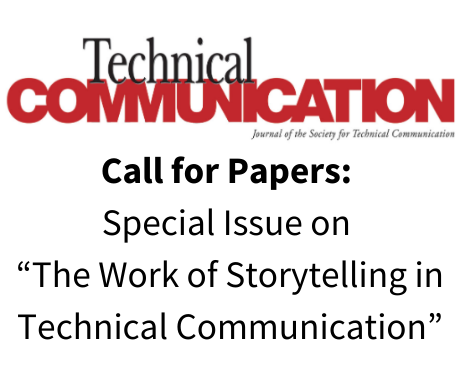Proposals for the special issue of Technical Communication on “The Work of Storytelling in Technical Communication” are due 1 October 2020.
Guest Editors:
Kyle P. Vealey, West Chester University
Jeffrey M. Gerding, Xavier University
In keeping with Technical Communication’s mission to publish research about the practical
applications of technical communication (TC) theory, this special issue explores the vital,
rhetorical role storytelling plays in TC as a field and profession.
Click here for an overview of the special issue: Call for Papers: Storytelling in TC
Topics to Consider for the Special Issue
In their preface to Narrative and Professional Communication, Perkins and Blyler (1999) recall
deliberately choosing to keep the initial call for papers and its definition of narrative as open and
inclusive as possible so that potential contributors would come to the topic with their own
perspectives, values, and understandings of stories (p. ix). Doing so, they suggest, invited a
broad range of scholarly contributions that “both legitimize narrative in professional
communication as a vibrant focus of research, pedagogic, and practical interest and offer many
possible directions for future work” (p. ix). In keeping with the spirit of Perkin and Blyler’s
inclusive approach, our goal for this special issue is to gather together diverse and innovative
perspectives on storytelling and its role in TC today. Our CFP invites research articles that, in
some form or fashion, address the multifaceted role storytelling plays in contexts of technical
and scientific communication, including but not limited to:
● Storytelling as a methodology for TC research and practice
● Storytelling as a pedagogical approach to TC for graduate or undergraduate students
● Stories and storytelling practices in technical, scientific, or medical workplaces
● Storytelling in human-centered design or user experience research
● Storytelling as an instrument for social justice in TC
● Storytelling in/as information or experience architecture
● Diverse perspectives and voices in storytelling
● Stories of failure, uncertainty, and lessons learned
● Storytelling about big data, archival work, data visualizations, etc.
● Storytelling as an embodied and/or material practice
● Stories in/of extra-institutional TC
● Intercultural, global, non-western approaches to storytelling in TC
● Storytelling in public scientific initiatives or programs
● Stories about/from writing program administrators and TC program directors
● Storytelling that pays specific attention to genre, form, medium, and style.
● Storytelling in public planning, policy writing, and government service design
● Stories of activism, organizing, community engagement, and civic participation
● Visual forms of storytelling in TC (i.e., comics, infographics, etc.)
● Storytelling in the aftermath of natural or human-instigated disasters
● Stories of complex environmental problems or crises
● Stories of interdisciplinary collaboration and academic/industry partnerships
Types of Manuscript for the Special Issue
Proposals for the following types of manuscripts will be considered for publication in the special
issue:
● Original research articles
● Review articles
● Focused commentary
● Teaching cases
● Case studies
Deadline for submission of proposals is 1 October 2020.
Submission Procedures for Proposal
● Cover page containing your name, institutional or company affiliation, and email
address.
● 400-word proposal
● All submissions will be reviewed by at least two readers, whether you are submitting a
research article, review article, focused commentary, teaching case, or case study.
● Proposals should be sent as a .docx, .doc, or .rtf file attached to an email message with
the subject line: “The Work of Storytelling in TC”
● Submit proposals or direct any questions via email to Kyle P. Vealey
(kvealey@wcupa.edu) and Jeff Gerding (gerdingj1@xavier.edu)
More info: Call for Papers: Storytelling in TC

